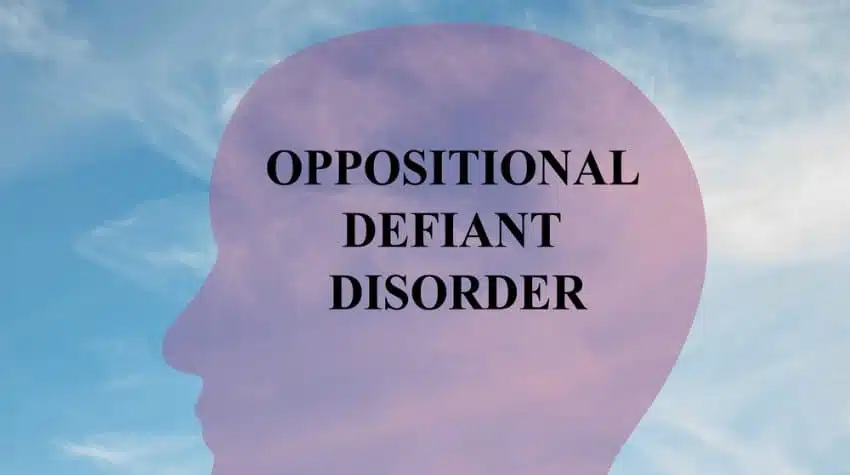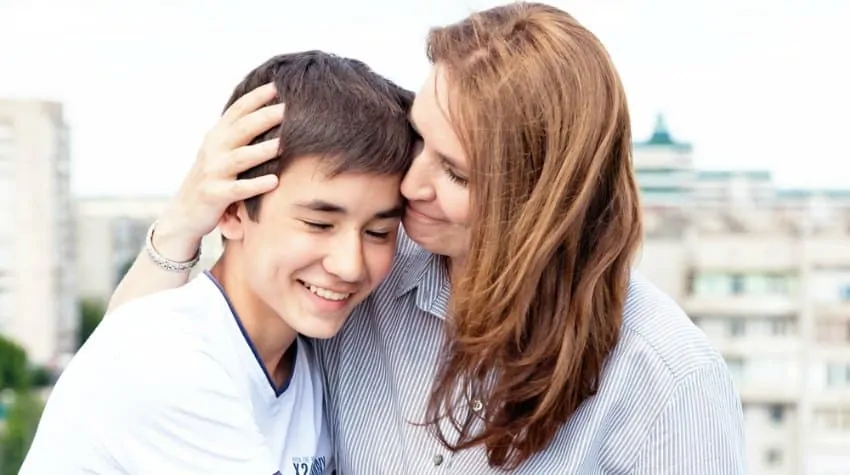Updated on January 24, 2023
As a parent, how do you tell the difference between a moody and argumentative teen and teens with oppositional defiant disorder?
The odd truth about Oppositional Defiant Disorder (ODD) is that it is a common yet misunderstood disorder that affects up to 10% of children and teens. ODD is a disruptive behavior disorder characterized by uncooperative, defiant, and hostile behavior toward authority figures.
It affects approximately 5-10% of all children and teens, making it one of the most common childhood disorders. Despite its prevalence, ODD is often misunderstood, misdiagnosed, and overlooked. In this blog post, we’ll explore the signs and symptoms of ODD and how to recognize and treat it.
96% of Conduct Disorder cases also have ODD.
What is Oppositional Defiant Disorder?
ODD is a mental health disorder characterized by recurrent defiant, hostile, and disobedient behavior toward authority figures that persists for at least six months. Oppositional Defiant Disorder (ODD) is typically diagnosed in children and teens and affects boys more frequently than girls.
Studies have shown that ODD can predict future serious behavioral problems, including substance abuse, Conduct Disorder (CD) and Antisocial Personality Disorder (ASPD). It is also closely linked to other behavioral issues like Attention Deficit Hyperactivity Disorder (ADHD) and Asperger’s Syndrome. (AS)¹

How is Oppositional Defiant Disorder Diagnosed?
If your child displays four or more of the following behaviors repeatedly, they will receive an ODD diagnosis.
- Frequent temper tantrums.
- Often arguing with adults.
- Defying rules
- Refusing responsibility
- Blaming others for their mistakes.
- Often being touchy or easily annoyed.
- Being angry and resentful.
- Being spiteful or vindictive.
Parenting a child with ODD can be highly stressful and make parents feel utterly alone and overwhelmed. Working with child development experts or therapists is essential to the treatment. Participating in support groups also helps parents feel less lonely and learn from others who have or are experiencing similar challenges.
Other signs of ODD to look for include:
- difficulties relating to children their age
- problems making and maintaining friendships
- frequent spiteful and vindictive behaviors towards anyone who offers corrections.
Parents should know that not all teens who are argumentative and resist correction have ODD. It is true that teens are argumentative and struggle with their emotions during adolescence. The difference between ODD and normal teen defiance is the frequency of the negative behaviors.
By recognizing the signs of ODD and taking the proper steps to treat it, parents can help their children avoid more serious mental health issues later. If you suspect your child has ODD, schedule a psychological evaluation by a mental health professional.
The link between ODD and Troubled Teens:
Recent studies have found that ODD is a predictor of Conduct Disorder leading to aggressive outbursts, substance abuse, academic failure and even delinquency.
Many teens with ODD have other undiagnosed conditions, such as ADHD, a learning disorder, or a mental health issue which often results in risky behaviors.

The Link Between ADHD and ODD:
There is a strong correlation between ADHD and ODD; in fact, 47% of children with ADHD also have ODD. These children also have higher rates of depression and anxiety and are at a higher risk of antisocial behavior as they age.
Both disorders share similar symptoms like difficulty following rules and instructions, impulsiveness, poor attention span, and difficulty managing anger. Children with intellectual disabilities like learning, problem-solving and poor judgment have higher rates of ODD and CD. ADHD– it is not a predictor of ODD.

What Causes ODD in children:
While the exact cause is unknown, some experts believe that ODD results from an imbalance in brain chemicals and neurotransmitters, while others point to environmental factors such as lack of parental guidance or discipline.
For instance, naturally strong-willed children and those that undergo a lot of stress in their lives, or were subjected to aggression, harsh discipline, bullying, neglect, trauma, or other types of abuse during childhood are more likely to develop ODD.
Other risk factors include:
- Lack of parental supervision
- Children who lose a la loved one suddenly or whose parents’ relationships are troubled.
- Unstable family circumstances.
- Childhood trauma or abuse
- Genetic disposition to develop the disorder
- Brain function – how executive functions are regulated
- Delayed emotional maturity and poor coping skills
- Lack of serotonin or other chemical imbalances
An early diagnosis and an individualized treatment plan can make the difference between your teenager learning to manage their behavior and impulses or straying further into a troubled life.

Treatment for ODD:
ODD is usually treated with psychotherapy, medication, and behavioral interventions like
- Individual and Family Therapy – Providing individual counseling and following it up with family therapy can help teach family members healthier ways to express their emotions. Family members can get involved and see their role in the family dynamics. ODD children and teens will also be more assured that their family is willing to make changes and commit to helping them recover.
- PCIT (Parent-Child Interaction Therapy) – In this kind of therapy, therapists coach parents as they interact with their children. The scenario is usually in a room with a camera or one-way mirror, with parents wearing hearing devices so that therapists can coach them without the child seeing or hearing it. As a result, parents learn more effective parenting techniques geared toward building positive experiences and interactions with their children.
- Parent Management Training – A bit similar to PCIT, just a bit more simple. Parents are coached by experienced mental health providers specializing in treating ODD. They are taught techniques for managing their stress and frustration and dealing with the problems that ODD teens and children can present. They are given ideas on effective punishments for teens and children, coached to learn how to keep their cool when provoked by their ODD kids, draw boundaries, and other essential parenting skills and approaches that are not confrontational.
- Cognitive Problem-solving Therapy – In this kind of therapy, ODD children and teens are helped to identify the kind of thought pattern they currently have and why this is harmful. Through collaborative problem-solving, young people with ODD learn to create new thought patterns and learn alternative ways to respond to certain problematic situations.
- Social skills training and behavioral interventions such as positive reinforcement, reward systems, and structure can also promote positive child behaviors and minimize ODD symptoms.
- Medication can help reduce symptoms of impulsivity, aggression, and hyperactivity and is often prescribed when the symptoms are severe or if other treatments aren’t working.
With the right treatment plan and a committed effort from both the child and their family, most children and teens with ODD will be able to lead happy and successful lives.
Prognosis for ODD
Treatment can be long and challenging, however, with the right strategies and interventions, these children learn how to manage their symptoms. Many children with ODD grow out of it and become symptom-free over time.
47% of children with ADHD also have ODD

8 Recommendations for Parents of Teens with ODD
As primary caregivers, parents are best positioned to recognize the signs of ODD and provide guidance, support, and structure. Parents need to remember that self-care is just as important as caring for a child or teen with ODD.
- Educate yourself about ODD, understand the disorder, and what triggers the behavior—establishing a good relationship with your teen by planning activities to help you bond as parent and child.
- Open the lines of communication with your teenager to reduce conflict and improve your relationship. Find activities that allow you to interact positively with your child or teen, such as playing a game or doing an art project together.
- Look for professional help for yourself. Get the support you need to deal with feelings and emotions that result from the stress of dealing with a child with ODD.
- Remember that Self-care is just as important as caring for your child—practice relaxation techniques such as yoga, deep breathing, or meditation to manage stress. Make time for yourself. Take a break from parenting and do something you enjoy.
- Start journaling. Make sure to have a journal and note any event or instances where your teen’s defiant behavior is triggered and how it makes you feel. Expressing yourself in this form will help you understand your triggers, reduce your stress, track your feelings and safely vent your frustrations.
- Join a parenting support group. Reach out to other parents who understand what you are going through. Talking to other parents who have experienced the same challenges can be invaluable in providing support and understanding.
- Don’t become a helicopter parent. While constantly monitoring their child’s activities and offering advice may seem like a way to help, it is not. For teens with ODD, this behavior is both triggering and detrimental making them even more resentful towards their parents.
- Avoid confrontations, don’t fight back! Your teens are already defiant by nature, and you will encourage the negative behavior to come out by fighting back. Always pick your battles with them.
Conclusion
Understanding the link between ODD and bad behavior is the first step to addressing problematic behaviors. A comprehensive treatment plan and consistent parenting lead to better outcomes for the child or teen and the entire family.
Overview of attention deficit hyperactivity disorder in young children. Singh A, Yeh CJ, Verma N, Das AK. Health Psychol Res. 2015;3:2115. [PMC free article] [PubMed] [Google Scholar]



















